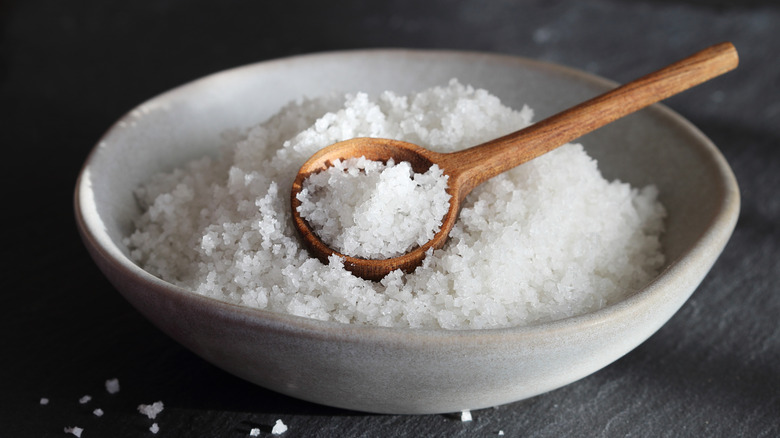Fix Bitter Coffee By Reaching For The Salt Shaker
There's a fine line between a cup of coffee having notes of bitterness versus a cup of coffee that only tastes bitter. The former may be considered a sign of good coffee, whereas the latter is an indicator of something very wrong. If you've been drinking bitter coffee thinking that's what it's supposed to taste like or simply don't know what to do about the unpleasant acidic flavor, there's an easy fix: Simply add some salt. A dash is all you need to make a bitter cup of coffee taste better instantly.
Coffee gets some of its bitterness from the caffeine present in it, which is why robusta beans, which tend to have more caffeine than arabica, are perceived to be more bitter. Contrary to popular misconception, however, bitter is not the only taste that coffee has, and it's certainly not a dominant flavor. Arabica coffee, for example, also has sugars that can counteract the bitterness when the beans are handled properly.
Additionally, coffee beans have a whole spectrum of flavors that are naturally present in them which are influenced by the variety of beans and how they are grown, processed, roasted, and brewed. More often than not, overly bitter coffee has more to do with bad quality beans, how long the beans have been roasted, wrong grind size, water that's too hot, dirty coffee machines, and over-extracted coffee than anything else.
How does salt fix bitter coffee?
Salt may be an inconspicuous seasoning, but its effects are monumental. Salt is a flavor enhancer that, when added in high proportions, can increase the taste of umami by suppressing sweet flavors. Add it in smaller quantities, however, and it increases sweet, umami, and sour tastes by suppressing bitterness. This is why dessert recipes often call for a tiny pinch of salt — a pinch being the keyword. And it's why bitter coffees could do with it, too.
The Coffee Excellence Center's Head of Flavor, Sara Marquart, explained to Perfect Daily Grind in 2021 that "the addition of salt in coffee dampens bitterness without using other additives." You could go about fixing bitter coffee with heaps of sugar and milk, but for a more effective solution, salt is a clever option. When salt is added to coffee, both salt and bitter taste receptors activate on our tongues at the same time. This, Marquart says, "can lead to [something called] 'cross-modal perception,' [which] suppresses the bitter taste and increases other taste senses, such as sweetness."
Whether you've let your coffee brew for a little too long, accidentally used boiling hot water, or are simply left with a bag of beans that are roasted too dark for your liking (darker beans have more phenylindanes, which also heighten bitter flavor), it's nothing some salt can't fix.
How should you add salt to coffee?
If you can preempt that a cup of coffee is going to taste bitter, a good way to dampen its intensity is by adding salt along with the coffee grounds into a machine before you brew it. This may be especially helpful if you have beans that are roasted much darker than you prefer, which you know will need some salt before getting started. In general, you'll only need a quarter teaspoon of kosher salt for every six tablespoons of coffee grounds.
If you've already brewed a cup of Joe and the bitterness of the coffee has taken you by surprise, you can add salt directly to the drink as well. In fact, adding salt to coffee after it's brewed may actually be for the better. This way, you get to taste the java, see exactly how bitter it tastes, and add salt little by little until it balances out.
Regardless of the method you choose, the trick here is to use very little salt; you don't want the coffee to start tasting actively salty. In some cases, a subtle tinge of bitterness may actually make the coffee taste good. Add too much and salt will not only reduce coffee's bitterness, but it will also mask the subtle flavors that are naturally present in coffee, subduing all the intricate flavors that make a particular batch of beans unique.



